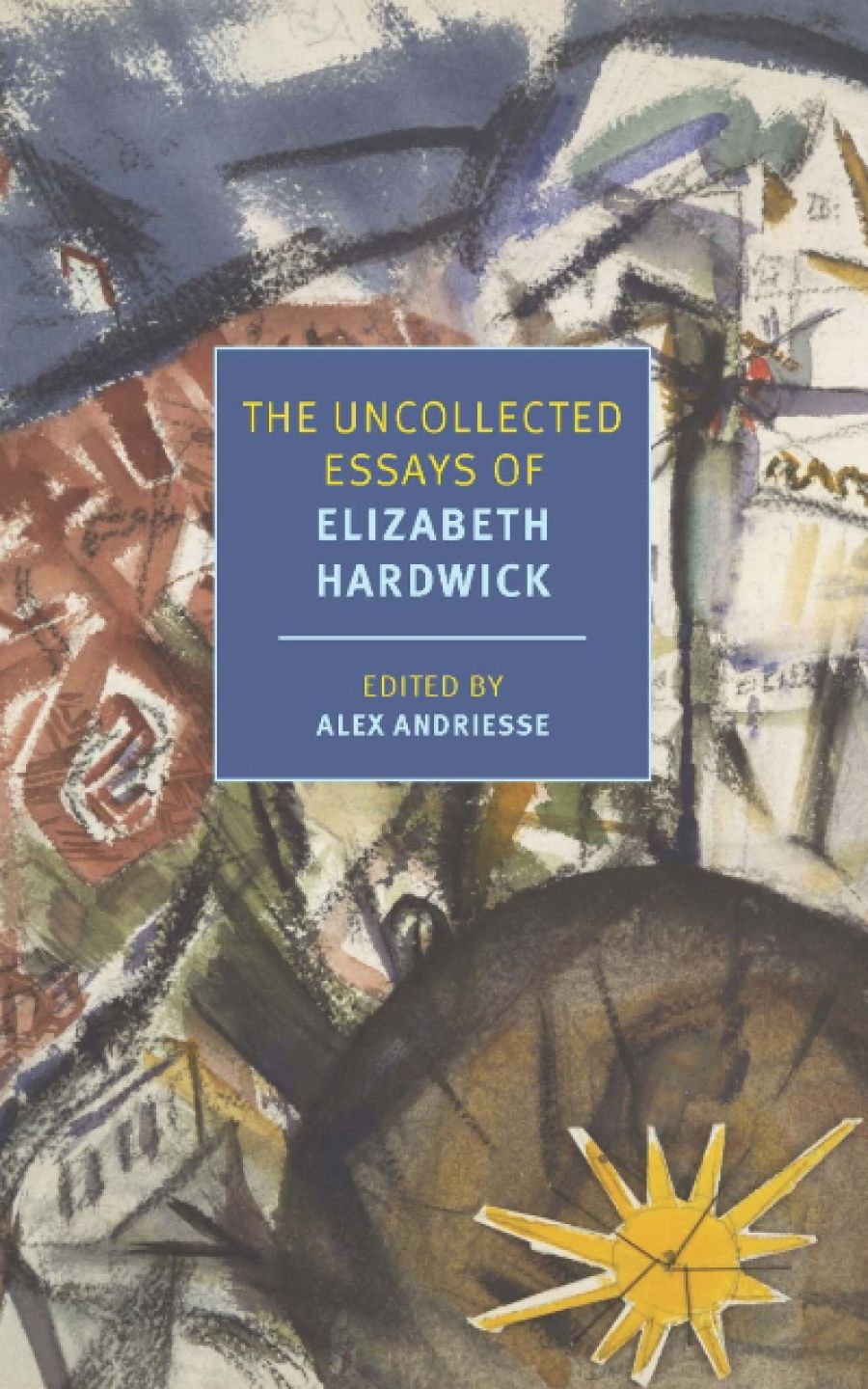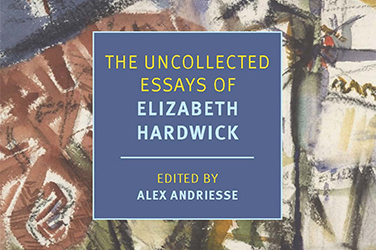
- Free Article: No
- Contents Category: Essay Collection
- Review Article: Yes
- Article Title: ‘Still all air and nerve’
- Article Subtitle: The joyously quotable Elizabeth Hardwick
- Online Only: No
- Custom Highlight Text:
The American poet Robert Lowell (1917–77), I don’t suppose, intended to eclipse his contemporaries, competitors, rivals, wives, any more than in one of his poems the new esplanade along the Charles River intended to stamp down ‘grass and growth’, as he rather vaguely puts it, with ‘square stone shoes’, but it’s what he did. Now, in the almost half a century since his passing, and the end of ‘the age of Lowell’, as one critic christened it back in the 1960s, his largely unintended oppression has unbent; as in the Grimms fairy tale called ‘The Frog King’, one hears the succession of hoops giving way.
- Article Hero Image (920px wide):
%20copy.jpg)
- Article Hero Image Caption: Elizabeth Hardwick, 1967 (Everett Collection Historical/Alamy)
- Alt Tag (Article Hero Image): Elizabeth Hardwick, 1967 (Everett Collection Historical/Alamy)
- Featured Image (400px * 250px):

- Alt Tag (Featured Image): Michael Hofmann reviews 'The Uncollected Essays of Elizabeth Hardwick' edited by Alex Andriesse
- Book 1 Title: The Uncollected Essays of Elizabeth Hardwick
- Book 1 Biblio: New York Review Books, US$18.95 pb, 295 pp
- Book 1 Readings Link: booktopia.kh4ffx.net/ORxjOK
Take Elizabeth Bishop, long thought of as ‘the poet’s poet’s poet’ (the wag’s wag’s term is John Ashbery’s). Well, her reputation has sailed past Lowell’s – as I daresay her sales have too. The novelist Jean Stafford (1915–79), Lowell’s first wife, has achieved canonisation with two collected volumes of novels and stories (published in 2019 and 2021 respectively) in the Library of America series. Elizabeth Hardwick (1916–2007), Lowell’s second wife, is being assiduously reprinted and recollected. There are no fewer than five of her books now available from New York Review Books, including Seduction and Betrayal (on women in literature), the fabulously unconventional novel Sleepless Nights (which she described as ‘a short-wave autobiography’) and a Collected Essays, mainly book reviews from the New York Review of Books, which she helped co-found in 1963, weighing in at 600 pages. The latest of these is an exhilarating book of Uncollected Essays, with freer and more adventurously chosen pieces (what the French call thèmes) on feminism and summer, celebrity murders and the New York ballet, Faye Dunaway and Susan Sontag, George Wallace and Monica Lewinski, grits soufflé and Maine. It’s perhaps time to adapt the old saying to something like this: in front of every great woman there is a dwindling man.
It’s Hardwick’s boom that is perhaps the unlikeliest of the three. Her death is the newest, her output the most seeming-ephemeral. She has not come back to us bearing robust novels and stories and poems, but mainly articles, opinions, reflections, journalism. (Essentially, the gift she bears is herself.) She was longest and most deeply sunk into the Lowell story, as the saint and then the shriven martyr of his biography. In the twenty-odd years of their marriage, she coped with innumerable iterations of his cycles of mania, desertion, and depression, all of which she dealt with steadily and discreetly. Just as interest in Bishop was renewed and intensified by the publication of the letters she exchanged with Lowell (in the book called Words in Air, from 2010), so the rediscovery of Hardwick as a writer was accelerated by the publication of her correspondence with Lowell in The Dolphin Letters from 2019, when he was in England and Ireland with Caroline Blackwood, who was to become his third and last writer–wife. There is almost a sense of all these books as terminal, genre-valedictory publications: last book of writers’ letters, last book of reviews, last book of belles-lettres.
Many readers unfamiliar with Hardwick’s work will have come across her portrait in the poem ‘Man and Wife’ from Life Studies: ‘Oh, my Petite, / clearest of all God’s creatures, still all air and nerve: / you were in your twenties, and I, / once hand on glass / and heart in mouth, / outdrank the Rahvs in the heat / of Greenwich Village, fainting at your feet – / too boiled and shy / and poker-faced to make a pass, while the shrill verve / of your invective scorched the traditional South.’ Small, defensive, voluble presences in his work all seem to signal some connection to Hardwick – even Lowell’s nineteenth-century Union soldier ancestor, Colonel Robert Shaw, with his ‘angry wrenlike vigilance’ in the poem ‘For the Union Dead’. Well, it’s a memorial of sorts. Later, there were others, many in the 1973 book called For Lizzie and Harriet, like this one, citing their then teenaged daughter, Harriet: ‘ours sees me, “Genius, unwise, unbrilliant, weird,” / sees you “Brilliant, unwise, unweird, nerves.”’
Forget, for the moment, genius, unwise, and nerves; consider merely ‘brilliant’ and ‘unweird’. It does as a description of her virtues as a critic, and a writer. What first struck me, reading these Uncollected Essays and others of her writings, is her unusually large and well-aired vocabulary; these are not dictionary words, but part of a natural eloquence and resource. I offer three examples from her work – like three hairs from her head – to show what I mean: ‘thrift’, ‘baneful’, and ‘balky’. Not one is recherché, but each has depth: the unfashionable, somewhat unattractive virtue, the adjectives with their delayed or immediate consequences. Each one is complex, fought over, delicately assertive. Wine words, not lager or lemonade words. The contact they seek to make with the reader is lingering, not superficial. ‘This,’ she writes, ‘is what I had brought from home in Kentucky to New York, this large bounty of polemicism, stored away behind light, limp Southern hair and not-quite-blue eyes’.
To me, right now, no writer feels more joyously quotable. Witty, acerbic, original, true. Maybe Coleridge, whom I haven’t read. Hardwick shimmers between personal and impersonal, general and particular, crushing and amusing. Her pairings of adjectives and nouns or verbs and objects are often astounding. From Sleepless Nights there is ‘a putative mink’, ‘a rather pleasant carelessness’, ‘recipes with unexpected olives’, ‘harem resignation’, ‘the wan rosiness of a beaten sofa’, ‘and the heavy, dry, freckled, tufted Dutchmen, homely and reassuring’. The book she is trying to write is ‘a tumorous companion made up of the deranged cells of learning, experience, thinking’. She writes about ‘the fumes of a mésalliance’, about sandwiches coming in three fillings, ‘mud, glue, and leather’, about ‘dim soups from fresh vegetables’, about ‘the retarded dahlia, forever procrastinating, finally blooming in its liverish purples’. Then there is the suppleness of her syntax, the richly composed, provocative, sententious sentences – big subject, big predicate, great big décor – that leave the reader with little option than an ‘Ah’: ‘Difficulty inhabits Maine like the great spruce trees.’ ‘The tomb-dwellers look on from their decaf espressos.’ ‘The conditions for all literature are unknown, accidental, and unpredictable.’ ‘The landscape of America seems often like one of those endangered kingdoms in old sagas. Nightly, Grendel steals upon the knights sleeping in the hall and slays the fairest and the weakest alike.’ That from a piece on elections, and this next on the subject of taste: ‘Its arena of consequence is limited.’ Say it again: ‘Its arena of consequence is limited.’
Her similes have become famous – and if not, they deserve to be. She has an electrifying way with a sidestep ending, turning American exhaustiveness and American impertinence on itself, seeming to say: You think this is a big deal – I got more, plenty more. In fact, I’m just getting started. A piece on murder ends with the televangelist fraudster and pervert Jim Bakker, ‘sentenced for fraud to sixty-four years – and nobody missing’; a piece on the Kennedys ends: ‘Just two celebrity murders, like that of John Lennon?’ It all chimes, one might say, with her love of ‘the impossible art, ballet’, the bustle and the stillness, the leap and the balance. The precise movement, the daring movement, the unexpected movement, the beautiful movement. Then there is that ability to make a quotation sail that Lowell ascribed to Randall Jarrell. Time and again in these essays one comes upon not just a few words or a line or two, but a good chunk of writing, and often from some wholly extraneous source. In this way, everything Hardwick wrote also functions as a commonplace book. That includes the novel, Sleepless Nights, which has Apollinaire on its first page, and then refers to Goethe, Nietzsche, Borges, Pasternak, Leconte de Lisle, Victor Hugo, and Ibsen, all in its first ten pages. It’s as though no one thought to tell Hardwick that being literary was a no-no. Or they did, and she told them where to get off.
And at the same time, she is closer to ‘the culture’ than most of her cohort, seeing the delivery boy in Manhattan, and knowing what he schleps with him in what she calls his ‘archival load’: ‘low-sodium seltzer water, kosher hot dogs, low-cholesterol mayo, Perdue chicken breasts, Weight Watchers margarine, four-grain bread, Ben and Jerry’s Chocolate Cherry Ice Cream, Paul Newman’s marinara sauce …’ Everybody rails, everybody inveighs, appeals, exhorts, but not like this. Dumbing down was alive and well, but it didn’t have a name yet, and she sees the ‘unusual squalor, or perhaps a usual squalor spreading its scrofulous blight over the American landscape’ and ultimately pays witness to ‘the drastic diminishment of the civil and political life of the nation’, without a blink or a glimmer of hope or ignis fatuus of happy end. Here is America the tacky, America the timid, America the full-on inadequate. Her piece on George Wallace, racist once and future governor of Alabama, written sixty years ago, seems retro-projected in its prophetic dinginess. No outsider could have come up with such a classic diatribe compounded of jeer, balance, diction, transfixing detail, rhetorical power, and murderous hatred: a portrait of the Pharisee as rat-catcher as rat: ‘but neither he nor Lurleen ever stepped aside from an undeviating lower-middle-class glumness, discomfort, a faithful consumption of catsup and the more shoddy offerings of Main Street. Wallace in his plastic-like, ill-cut suits, his graying drip-dry shirts, with his sour, dark, unprepossessing look, carrying the scent of hurry and hair-oil: if he were not a figure, a star, he would be indistinguishable from the lowest of his crowd. […] It is as if he were a sort of mythical bearer of the meagerness and the power of America.’
It’s perhaps not a surprise that ‘interest’ is repeatedly hailed in Hardwick’s writing as the ultimate value. Susan Sontag is described, wrongly, I think, as ‘the most interesting American woman of her generation’. (Unlike Hardwick, she was too interested in being interesting. Professionally interesting. Not enough unweirdness.) To the actress Faye Dunaway, who surely missed her generation (her best films would have been made in the 1940s and been shot in black and white), she offers this: ‘But to the thoughtful, the electricity of the negative qualities gives her an extraordinary interest.’
‘What is interest,’ mused Wallace Stevens, ‘is it a form of liking?’ Probably not, but there is nothing else worth pursuing. ‘Yet the most interesting,’ she says, writing of essays, ‘will have the self-propelled interior life of imaginative literature, and this is true even when they are responses to an occasion’. Hers sure do.


Comments powered by CComment